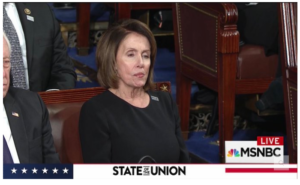- Democrats in attendance rate an F minus and should be expelled
- Most memorable line: “Americans are dreamers too ” although it can be taken as a tweak at the pretensions of the DREAMers it does not have to be
- Democrats would not even stand for that line

The countenance of Pelosi
throughout the speech and
and Steny Hoyer sitting
next to her and all but a
very few Democrats would
have rated a slap from the
nuns that educated Pelosi.
The speech was well delivered and touched most points that we would have recommended. Trump used appropriate “audience participation “– referencing people in the audience with stories linked to policy matters. Such can turn a bit maudlin but the choices were primarily about perseverance, and so, inspirational. We found the North Korean dissident who persevered in spite of horrifying injury and torture to be particularly so. His raising of his crutches was something to stand for indeed.
The outline Trump gave of his immigration policy is something we need to see a more definitive presentation on.* The path to citizenship requirements may be politically necessary, practical in some ways, but any overall moral claim is wanting. Clearly those who violated reasonable immigration law (parents and children) get rewarded. They get to stay (who wouldn’t take the deal risking some dissipating opprobrium — for a lot of welfare, free schooling, security and a path to citizenship?). Those who obey our laws are left on the outside looking in, their numbers expanded because legal immigration numbers must be more limited as a result of the influx of illegal. Legal immigrants are elbowed out.
Yesterday’s The Federalist offered a more involved grading system regarding Trump first year in office. Published before his SOTU speech, it is a compendium of conservative commentators’ views on Trump’s performance using the traditional letter grade description. We think any grade only a year in, given that “school” as in the Senate, wasn’t even open for most of the year should be “good progress but incomplete due to outside factors.” And given what has been arrayed against Trump we would give A for effort grades a little more often.
Drawing any conclusion from his trade policies as some of the commenters did is silly as most of what has been accomplished is to position to renegotiate better deals. We also note that Iowa’s Senator Joni Ernst was not happy with the restrictions on solar panels Trump recently announced. Her view is that we cannot get enough home grown ones. We suspect her view is parochial. We find the entire scale of that industry to be way off base, the demand artificial or of no impact to real health of the country, certainly not to be subsidized. So Trump’s action is not anti-free market anymore than the very industry.
Here’s How Conservative Policy Wonks Grade Trump’s First Year
We asked a wide range of conservative policy experts to grade President Trump on his first year in office. Across seven policy areas, Trump averaged a grade of B/B-.
(one excerpt)
Perry said that in his first year, Trump has shown he’s committed to pursuing “an outdated, protectionist ‘American Consumers Last’ trade policy that is putting the U.S. economy at great risk.” Perry cited the administration’s withdrawal from the TPP, threats to leave the North American Free Trade Agreement, and tariffs imposed just last week on Americans who purchase imported washing machines and solar panels. “Trump’s protectionist approach to trade is guaranteed to reduce competition, restrict choices for Americans, and raise prices for consumers,” Perry said.
V’pac note: Take a pill Perry. Let’s see if our competitors stop protecting their industries off the books, and then reflect on whether we have been saps. We respect that consumers and business in general benefits from free trade and we want to see it continue where it exists. We recognize that protectionism is a species of corporate welfare / crony capitalism. But the argument is whether certain trade deals were actually fair deals and the supposed enforcement mechanisms useful and appropriate, including as regards national sovereignty.
R Mall
*Lyman Stone who writes on immigration issues at The Federalist has this to say (excerpt)
The Good, The Bad, And The Ugly Inside Trump’s Immigration Proposal
President Trump has proposed a major immigration plan that includes a path to citizenship for nearly two million protected illegal immigrants and $25 billion for a border wall. . . .
Legal Status for Nearly 2 Million “Dreamers”
Trump has proposed the largest amnesty since President Ronald Reagan’s amnesty in the 1986 immigration reform. But instead of targeting just anyone who’s lived here long enough, as Reagan’s did, Trump’s amnesty plan targets people who came to the U.S. as children and have lived essentially their whole lives in the United States. These people, known as “dreamers,” are typically native English speakers with family already in America.
Rather than simply giving permanent residency to 690,000 current recipients of Deferred Action for Childhood Arrivals (DACA) recognized by the Obama Administration, Trump’s amnesty would open the door to legal residency for anyone who would have been eligible for DACA, whether they received it or not, which could be as many as 2 million illegal immigrants. This would be a huge concession to immigration advocates, and give them the biggest win they’ve had on immigration in over a decade.
